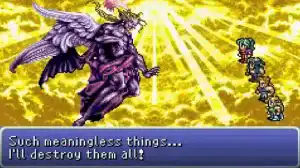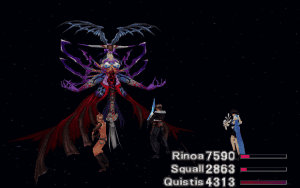Below is an in-depth analysis of five such classic Final Fantasy battles where the victory for the heroes appears nothing less than miraculous, battles that they very well might not have won. From the depths of the moon to the edge of time itself, each conflict pushes our heroes to the absolute brink, only to find them survive by sheer force of will, strategic genius, or narrative intervention!
1. Zeromus (Final Fantasy IV)

Once Zemus transforms into Zeromus, the embodiment of all his hatred, he promptly slices Fusoya and Golbez, leaving Cecil’s party hopelessly outmatched on the moon’s surface. Zeromus bombards Cranidos with meteors at will, and his invincibility pushes Cecil to resort to the prayers of the people of Mysidia in a bid to revive his fallen allies. It is the collective hope and faith of the elders of Mysidia alone that brings the heroes back from the brink of death, an outcome so improbable it feels like the hand of God.
Despite the relief of resurrection, the party enters battle drastically weakened: each member is on the precipice of defeat, their HP at a bare minimum from Zeromus’s Bio and Flare counters. Their final Victory hinges on Cecil’s Crystal-wielding Paladin powers, a strength Zeromus first mocks as beyond the capacity of evil hearts. As Cecil calls upon the light of the Crystal, he shatters Zeromus’s invincibility and strikes the killing blow, a last-minute turnabout that feels less like earned skill and more like deus ex machina plot protection.
2. Kefka Palazzo (Final Fantasy VI)

Ascending to godhood on the Floating Continent, Kefka utilizes the naked magic of the Warring Triad to recreate the world, annihilate entire cultures with his “Light of Judgment,” and cackle in nihilistic victory. As “God of Magic,” his final form is all but unbeatable; he rips continents apart and deluges the ravaged world with beams of fiery light.
When the Returners eventually get to him at the top of his tower of wreckage, they are fighting an opponent whose spellcasting exceeds any sort of mortal capabilities. With spells such as Reverse and Dancing Mad’s various stages, Kefka ought to reasonably erase the party from existence within seconds. Rather, through a combination of perfectly timed Limit Breaks, Esper summons, and the sheer narrative imperative of a hero’s quest, they endure his cosmical fury and defeat the mad goddess. Another victory that strains the imagination in its demand for perfect timing and player preparation.
3. Sorceress Ultimecia (Final Fantasy VIII)

In Final Fantasy VIII’s climactic time–compression battle, Ultimecia warps past, present, and future into a singular, apocalyptic crucible. Her final form, emerging after the destruction of Griever, absorbs stars and planets into its void as she prepares to erase all existence.
Players must juggle four forms, endure her Shockwave Pulsar Overdrive, capable of a one-hit KO, and constantly adapt to her junction-system sabotage. Most parties only win by carefully spamming Limit Breaks to proc Shockwave Pulsar, then taking advantage of the temporary window of weakness before she gets a chance to fight back. In any sort of realistic situation, a sorceress capable of disabling the very magic your characters rely on ought to have wiped them out long before Squall, Zell, and Rinoa ever got a finishing blow in.
4. Necron (Final Fantasy IX)

After Kuja’s Ultima spell seemingly defeats the heroes, they awaken on the Hill of Despair, where they meet Necron, the personification of death itself. Summoned by the shattered Crystal, Necron seeks to return all existence to nothingness, and its “Neutron Ring” and “Blue Shockwave” attacks can reduce the party to near-death in an instant.
One fan theory goes as far as to suggest that Necron is Death personified, coming to claim the warriors that Kuja’s Ultima truly slew, and that their fight is a war of wills to cling to life. Yet even as an anti-entity beyond the boundaries of mortality, Necron is vanquished by a combination of Zidane’s bravado, Freya’s Dragon’s Crest, and the party’s sheer willpower, an ending that reads less like earned canon and more like a last-minute reprieve from oblivion.
5. Lady Yunalesca (Final Fantasy X)

Yunalesca, the unsent fiend who first mastered the sacrificial Final Summoning, battles Yuna and her guardians in a three-form fight of status effects and desperation. In her last form, she employs “Mega Death,” one-shotting any non-zombified character, and traps the party in a Zombie and Dispel mechanic cycle intended to grind them down.
Victory involves placing two zombified characters as “meat shields,” saving Aeon Overdrives for the finale, and memorizing her attack pattern by heart to endure. Despite this, one miscalculation leads to a permanent party wipe. Because Yuna’s pilgrimage hinges on mercy rather than murder, her triumph over Yunalesca, who by rights should annihilate all unprepared challengers, rests entirely on immaculate player execution and plot requirement.
Final Thoughts
These five encounters are the moments when Final Fantasy heroes skate on the thinnest of storytelling ice, surviving only by divine prayer, impeccable strategy, or an authorial safety net. There are many more that can be debated that our heroes should have lost, but most fans are in agreement that these 5 are almost sure that the heroes should’ve been defeated.
While they’re thrilling to play through, every victory teeters on the edge between epic triumph and improbable survival, battles our heroes maybe should have lost. If you’re a fan of the series, keep up to date with Final Fantasy news here!
More must-reads:
- NASCAR Cook Out Clash takeaways: Ryan Preece joins exclusive list with exhibition win
- Ryan Preece wins wild, weather-plagued Cook Out Clash at Bowman Gray Stadium
- The 'Super Bowl XLIX starters' quiz
Breaking News
Trending News
Customize Your Newsletter
 +
+
Get the latest news and rumors, customized to your favorite sports and teams. Emailed daily. Always free!








